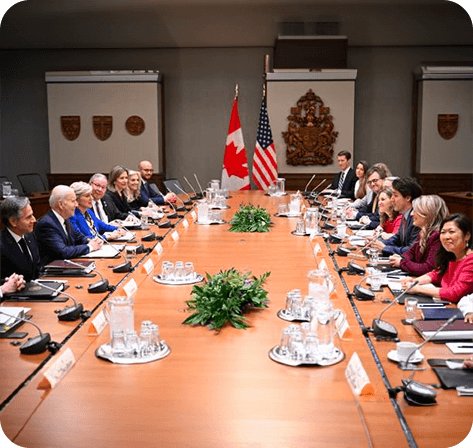Strengthening Bilateral Relations
Region: US/Europe

Overview
A former Soviet republic in Eastern Europe sought to enhance its bilateral relationship with the United States and to advance its goal of greater integration with the West. Given that a new U.S. president and Congress took office in 2009, it was necessary for the country’s leadership to reintroduce and re-position itself with Washington, primarily by presenting itself as a committed ally of the U.S. and a defender of democracy, both domestically and throughout the region.

Challenges
With intense competition for the limited attention of U.S. policymakers, the first challenge was developing and pursuing a constructive substantive agenda that would sustain their focus. Secondly, in contrast to the exceptional rapport developed during the outgoing administration, the newly-elected Obama Administration brought a new approach, defined by a more pragmatically realist philosophy and an intention of pressing the “reset button” on relations with Russia. The latter, in particular, threatened to complicate U.S. relations with the former Soviet republic, given Russia’s discomfort over NATO expansion.

Strategic Recommendations
In order to overcome these challenges, Blue Star Strategies developed a strategy to leverage support among the U.S. policy elite as well as public opinion for an enhanced bilateral relationship. Two primary strategic recommendations guided our approach: to work with the U.S. government to identify fruitful areas of mutual interest on which to focus engagement; and to establish a stand-alone framework for a new bilateral relationship with the U.S. to be based on a number of areas of substantive engagement.

Program Highlights
With our deep ties to the U.S. Administration, Blue Star Strategies implemented a multi-track outreach program targeted towards key decision makers in the Executive, Congress, and among leading opinion leaders in order to promote a robust bilateral relationship. This outreach included Congressional meetings and hearings; high level bilateral engagements between the leadership of the two countries in order to develop a substantive agenda; a media strategy that included publications in the Washington Post, the New York Times, and the Wall Street Journal; and support for an ongoing program of roundtable discussions and events in collaboration with prominent think tanks and leading scholars.

Results
Blue Star Strategies’ efforts resulted in a number of critical advancements in the bilateral relationship. U.S. officials better understood the importance of a closer bilateral relationship at the highest levels and Members of Congress publicly supported this relationship, clearly stating that the U.S.-Russia “reset” must not be allowed to occur at the expense of such important alliances. A series of high level bilateral visits demonstrated the mutual commitment to an improved relationship, including at the vice presidential and Ministerial levels, as did the inauguration of a newly created bilateral commission in Washington, DC.
